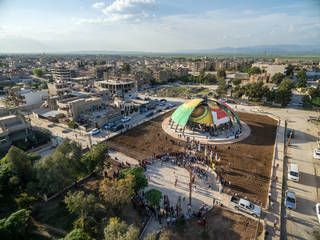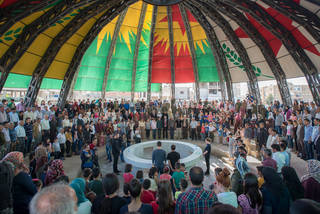The new 'people's parliament' officially opened in April 2018 in the city of Derîk, in the northern part of Syria (known as Rojava). Kurdish revolutionaries declared Rojava independent in 2012, and instituted their own alternative model of stateless democracy. The new parliament aims to both represent and put into practice the self-governing principles of the Rojava Revolution – including gender equality, communal economy and secularism. Rather than an independent state, Rojava is organized as a 'stateless democracy', aimed at local self-governance. Despite ongoing threats by ISIS and recent attacks by Turkey, the self-administration has been able to practice a new social model.

The parliament works as a public space, used by local communities for demonstrations, cultural events and international conferences. It's a symbol of a new world in the making. It could be said that the architecture of the parliament, the design of a symbolic space of gathering, actualizes the possible world imagined by the Rojavans.
The Democratic Self Administration of Rojava (DSA) is the self-governing area in the North-East of Syria. The DSA is governed and defended by Kurds, Arabs and Syriac Christians, as well as any other ethnicity living in the DSA. The Syrian Democratic Forces (military force of the DSA) in alliance with the USA and International Coalition against ISIS have been the most effective force in the war against this terrorist entity in Syria.

The self-administration of Rojava bases its policies on the writings of the revolutionary Abdullah Öcalan, who proposed a model called 'democratic confederalism', in which principles such as democratic, bottom-up, self-government, gender-equality and communal economy take a central role. The most remarkable aspect of democratic confederalism is its rejection of the model of the nation-state. The Kurds have historically been separated by the borders of four states, Turkey, Syria, Iran and Iraq. In all of these states they have faced structural repression. In Öcalan's reasoning, the state, with its colonial and patriarchal heritage, cannot be a solution for the Kurds' quest for self-determination. So instead of fighting for an independent Kurdish state, the Kurdish revolutionary forces propose a decentralized model in which peoples govern themselves, a model that Öcalan describes as "democracy without the state".
Courtesy of the Democratic Self-Administration of Rojava and Jonas Staal
Find out more





